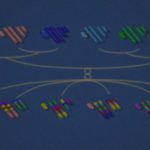Lien vers Pubmed [PMID] – 11065339
J. Am. Soc. Nephrol. 2000 Nov; 11 Suppl 16(): S101-5
An increasing number of scientific articles report that the phenotype of a given single gene mutation in mice is modulated by the genetic background of the inbred strain in which the mutation is maintained. This effect is attributable to so-called modifier genes, which act in combination with the causative gene. The modulation of the phenotype can be major, as exemplified in the case of several mouse models of polycystic kidney disease. Because of the existence of inbred strains and the possibility of developing congenic strains, the effect of the genetic background can be analyzed in mice, including the identification of major modifier genes. Furthermore, by transferring a given mutation into different genetic backgrounds, mouse models can be manipulated with the aim of more accurately mimicking specific features of human diseases.

